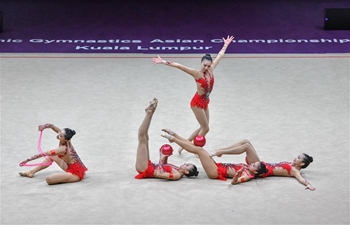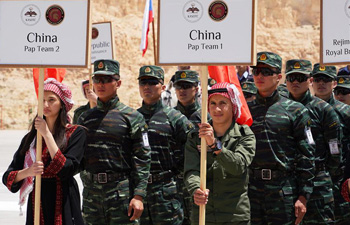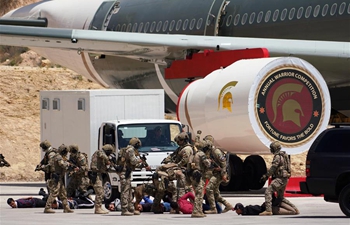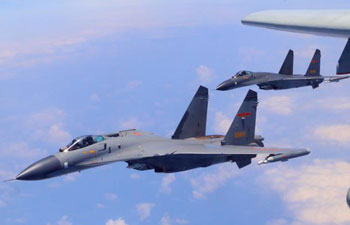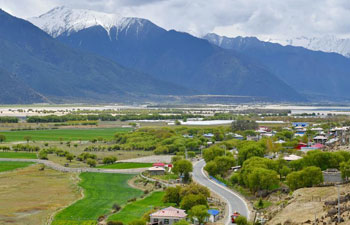DOHA, May 1 (Xinhua) -- As the Gulf crisis is approaching its first year without a solution, experts believe that all parties should positively and seriously respond to the latest calls to end the rift to remove the negative impacts on the regional economy.
The current economic indicators in the Gulf countries showed limited economic impacts, arguing that the short-term effect can be overcome in the near future by the rich oil and gas reserves, huge foreign reserves and financial surpluses.
However, experts warned that Gulf countries cannot rely on that because of the geopolitical challenges and economic changes.
On June 5 last year, Saudi Arabia, the United Arab Emirates (UAE), Bahrain and Egypt severed ties with Qatar, accusing the latter of supporting terrorism and meddling in the affairs of Arab states. Doha strongly denies the charges.
The blockading countries cut diplomatic and economic relations with Qatar and took punitive measures, including the closure of its access to use the navy and air fields in front of it.
All the mediation efforts made by the United States, Kuwait, and calls by the other Arab regional and international countries to settle the crisis have failed.
But recently, international calls to the concerned parties to solve the dispute have been rising.
The U.S. President Donald Trump, a close ally of both sides, has called on the leaders of these countries to end the conflict. The same call was made Sunday by the U.S. Foreign Minister, Mike Pompeo, during his first visit to Saudi Arabia.
"Without a doubt, the continuing crisis, in general, could harm the interests of all parties which would be a distraction of development efforts... that will lead to draining of the economy and disrupting the growth and construction,'' said economist Hassan al-Ali.
Al-Ali argued that the Gulf crisis would also hamper economic integration among the concerned countries, disrupt the flow of goods, as well as reduce the investment and rise further tension that will hinder long-term development.
He cited the statistics of the Gulf Cooperation Council (GCC) showing that the value of suspended inter-trade between Saudi Arabia, the UAE, Bahrain and Qatar has reached 9 billion dollars, accounting for 87 percent of the total trade between the two sides.
Al-Ali pointed out that there are also several repercussions on the growth rate, the inflation, the unemployment and the blurring of the future of cooperative projects among the Gulf states.
The four Arab countries issued a 13-point list of demands to end the standoff, including closing Al Jazeera media network, curbing relations with Iran, shutting the Turkish base and expelling the wanted individuals who are currently domiciled in Qatar.
Qatar has rejected the demands, announcing its readiness to sit down and discuss the claims raised by its Arab neighbors, without prejudice to the sovereignty of states.
Adel Al Yafei, General Manager of the Smart Well Consulting and Smart Technology, has agreed with Ali, pointing out that there are geopolitical challenges resulting from the ongoing crises in the region, in addition to the economic changes generated from the fluctuations of energy markets.
''In addition to this, the countries of the crisis believe that their impacts are limited and that they are able to overcome them. Therefore, the involved parties are still stuck in their positions," Yafei told Xinhua.
In short term, the challenges can be solved because of the rich oil and gas reserves in these countries, but that will not last for long, he argued.
The Gulf countries have long been considered as stable and safe for investment, however, the ongoing rift has weakened the business confidence indicator, which showed the level of investment intention, and can thus discourage investment, said Yafei.
Moreover, the impact will not be limited within the countries involved, but will extend to affect the neighboring countries with less robust economies, such as Jordan and Lebanon, said Haitham Ibrahim, an economic analyst.
Eighty percent of Qatar's food was imported from its neighbors, including 40 percent through the Salwa border crossing with Saudi Arabia, which is now closed.
The closure also prevents trade from Jordan and Lebanon to Qatar, and forced both sides to use the alternative export channels which are more expensive.
In this regard, Jordan, whose agricultural exports to Qatar account for 11 percent of its total exports, has been greatly affected with a direct loss of 15 million dollars during the first two months of the crisis, mainly on its farmers, said Ibrahim.
On the other hand, Ibrahim pointed out that investment made by Qatari businessmen has stopped, due to the rise in the cost of Qatar's exports to Jordan, especially the mineral and oil materials, which are deeply needed in the industrial sector.
Experts concluded that the ongoing Gulf crisis has harmed the economic interests of all, stressing that the only way to implement the ambitious economic visions of the Gulf states and to protect the fragile economy, is to positively respond to the calls for solving the crisis to create an atmosphere of political stability that would stabilize the environment of the economy and investment.





